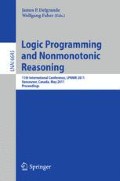Abstract
We propose an approach for modularizing P-log programs and corresponding compositional semantics based on conditional probability measures. We do so by resorting to Oikarinen and Janhunen’s definition of a logic program module and extending it to P-log by introducing the notions of input random attributes and output literals. For answering to P-log queries our method does not imply calculating all the stable models (possible worlds) of a given program, and previous calculations can be reused. Our proposal also handles probabilistic evidence by conditioning (observations).
Access this chapter
Tax calculation will be finalised at checkout
Purchases are for personal use only
Preview
Unable to display preview. Download preview PDF.
References
Anh, H.T., Kencana Ramli, C.D.P., Damásio, C.V.: An implementation of extended P-log using XASP. In: Garcia de la Banda, M., Pontelli, E. (eds.) ICLP 2008. LNCS, vol. 5366, pp. 739–743. Springer, Heidelberg (2008)
Baral, C.: Knowledge Representation, Reasoning and Declarative Problem Solving. Cambridge University Press, Cambridge (2003)
Baral, C., Gelfond, M., Rushton, J.N.: Probabilistic reasoning with answer sets. TPLP 9(1), 57–144 (2009)
Baral, C., Hunsaker, M.: Using the probabilistic logic programming language P-log for causal and counterfactual reasoning and non-naive conditioning. In: Proceedings of the 20th International Joint Conference on Artifical Intelligence, pp. 243–249. Morgan Kaufmann Publishers Inc., San Francisco (2007)
Dao-Tran, M., Eiter, T., Fink, M., Krennwallner, T.: Modular Nonmonotonic Logic Programming Revisited. In: Hill, P.M., Warren, D.S. (eds.) ICLP 2009. LNCS, vol. 5649, pp. 145–159. Springer, Heidelberg (2009)
Gaifman, H., Shapiro, E.: Fully abstract compositional semantics for logic programs. In: POPL 1989: Proc. of the 16th ACM SIGPLAN-SIGACT Symposium on Principles of Programming Languages, pp. 134–142. ACM, New York (1989)
Gelfond, M., Lifschitz, V.: The stable model semantics for logic programming. In: Kowalski, R.A., Bowen, K.A. (eds.) Proceedings of the Fifth International Conference and Symposium (ICLP/SLP), pp. 1070–1080. MIT Press, Cambridge (1988)
Gelfond, M., Rushton, N., Zhu, W.: Combining logical and probabilistic reasoning. In: Proc. of AAAI 2006 Spring Symposium: Formalizing AND Compiling Background Knowledge AND Its Applications to Knowledge Representation AND Question Answering, pp. 50–55. AAAI Press, Menlo Park (2006)
Halpern, J.Y.: Reasoning about Uncertainty. The MIT Press, Cambridge (2005)
Kwiatkowska, M., Norman, G., Parker, D.: PRISM: Probabilistic symbolic model checker. In: Kemper, P. (ed.) Proc. Tools Session of Aachen 2001 International Multiconference on Measurement, Modelling and Evaluation of Computer-Communication Systems, pp. 7–12 (September 2001)
Lifschitz, V.: Twelve definitions of a stable model. In: Garcia de la Banda, M., Pontelli, E. (eds.) ICLP 2008. LNCS, vol. 5366, pp. 37–51. Springer, Heidelberg (2008)
Lifschitz, V.: What is answer set programming? In: Proceedings of the AAAI Conference on Artificial Intelligence, pp. 1594–1597. MIT Press, Cambridge (2008)
Oikarinen, E., Janhunen, T.: Achieving compositionality of the stable model semantics for smodels programs. Theory Pract. Log. Program. 8(5-6) (2008)
Pearl, J.: Probabilistic Reasoning in Intelligent Systems: Networks of Plausible Inference. Morgan Kaufmann Publishers Inc., San Francisco (1988)
Pearl, J.: Causality: Models, Reasoning and Inference. Cambridge Univ. Press, Cambridge (2000)
Pfeffer, A., Koller, D.: Semantics and inference for recursive probability models. In: Proceedings of the Seventeenth National Conference on Artificial Intelligence and Twelfth Conference on Innovative Applications of Artificial Intelligence, pp. 538–544. AAAI Press, Menlo Park (2000)
Poole, D.: The independent choice logic for modelling multiple agents under uncertainty. Artif. Intell. 94, 7–56 (1997)
Poole, D., Zhang, N.L.: Exploiting contextual independence in probabilistic inference. J. Artif. Int. Res. 18, 263–313 (2003)
Russell, S., Norvig, P.: Artificial Intelligence: A Modern Approach, 3rd edn. Prentice Hall, Englewood Cliffs (2010)
Zhang, N., Poole, D.: A simple approach to Bayesian network computations. In: Proceedings of the Tenth Canadian Conference on Artificial Intelligence, pp. 171–178 (1994)
Author information
Authors and Affiliations
Editor information
Editors and Affiliations
Rights and permissions
Copyright information
© 2011 Springer-Verlag Berlin Heidelberg
About this paper
Cite this paper
Viegas Damásio, C., Moura, J. (2011). Modularity of P-Log Programs. In: Delgrande, J.P., Faber, W. (eds) Logic Programming and Nonmonotonic Reasoning. LPNMR 2011. Lecture Notes in Computer Science(), vol 6645. Springer, Berlin, Heidelberg. https://doi.org/10.1007/978-3-642-20895-9_4
Download citation
DOI: https://doi.org/10.1007/978-3-642-20895-9_4
Publisher Name: Springer, Berlin, Heidelberg
Print ISBN: 978-3-642-20894-2
Online ISBN: 978-3-642-20895-9
eBook Packages: Computer ScienceComputer Science (R0)

